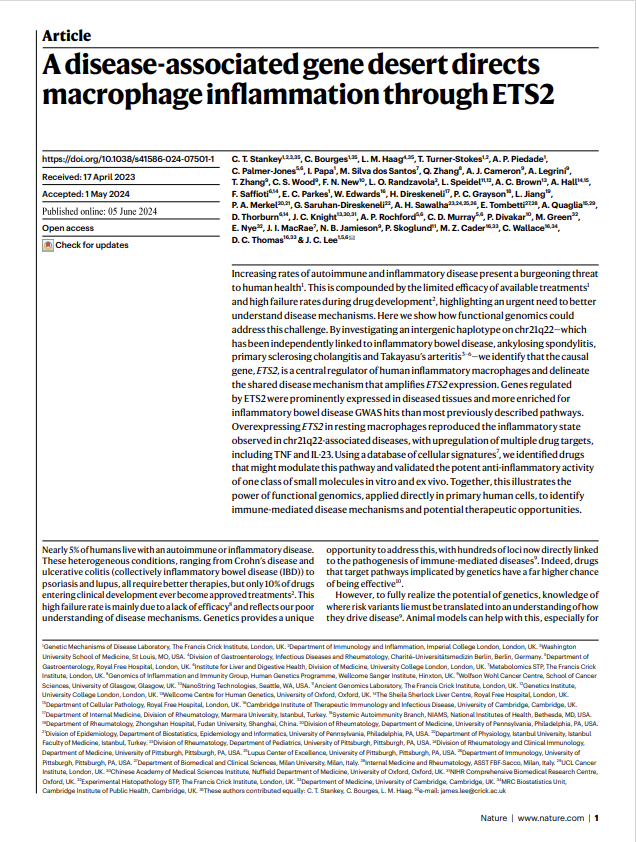Mechanisms of Autoimmunity: Genes, Pathways and Immunological Effects (MAGPIE)
Study code
NBR215
Lead researcher
Dr James Lee
Study type
Participant re-contact
Institution or company
The Francis Crick Institute, London
Researcher type
Academic
Speciality area
Gastroenterology
Summary
Changes in our DNA, called “mutations”, cause some people to get autoimmune diseases. However, exactly which mutations are responsible, and how these lead to disease, is unknown. We are studying a region of DNA that has been linked to several diseases, including Crohn’s disease and ulcerative colitis. We think this region controls inflammation in immune cells. We also think we know which mutation is responsible.
To see if we are right, we would like to do two experiments. First, we will introduce this mutation into blood cells from healthy people who do not carry it. We expect this will cause a nearby disease gene to turn on. Second, we will see whether patients with this mutation get worse inflammation than those without it. We hope to learn what goes wrong to cause these diseases. This may help us find better treatments.
Media coverage
The research was covered extensively in the media on the 6th June 2024 following the publication of the research in the scientific journal Nature on the 5th June 2024. Articles featured on the BBC website "Major cause of inflammatory bowel disease found" and in The Guardian newspaper "Bowel disease breakthrough as researchers make ‘holy grail’ discovery - scientists pinpoint driver of IBD and other disorders with work under way to adapt existing drugs to treat patients"
Research publication
Stankey, C.T., Bourges, C., Haag, L.M. et al. 'A disease-associated gene desert directs macrophage inflammation through ETS2'. Nature (2024). https://doi.org/10.1038/s41586-024-07501-1
Main findings
Increasing rates of autoimmune and inflammatory disease present a burgeoning threat to human health. This is compounded by the limited efficacy of available treatments and high failure rates during drug development, highlighting an urgent need to better understand disease mechanisms. Here we show how functional genomics could address this challenge. By investigating an intergenic haplotype on chr21q22—which has been independently linked to inflammatory bowel disease, ankylosing spondylitis, primary sclerosing cholangitis and Takayasu’s arteritis we identify that the causal gene, ETS2, is a central regulator of human inflammatory macrophages and delineate the shared disease mechanism that amplifies ETS2 expression. Genes regulated by ETS2 were prominently expressed in diseased tissues and more enriched for inflammatory bowel disease GWAS hits than most previously described pathways. Overexpressing ETS2 in resting macrophages reproduced the inflammatory state observed in chr21q22-associated diseases, with upregulation of multiple drug targets, including TNF and IL-23. Using a database of cellular signatures, we identified drugs that might modulate this pathway and validated the potent anti-inflammatory activity of one class of small molecules in vitro and ex vivo. Together, this illustrates the power of functional genomics, applied directly in primary human cells, to identify immune-mediated disease mechanisms and potential therapeutic opportunities.
